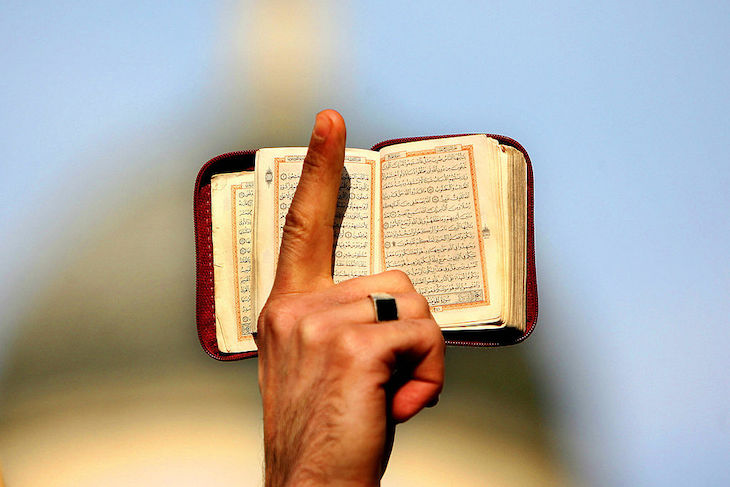You might well have felt slightly repelled if last February you had passed someone ineptly trying to set fire to a copy of the Quran on the streets of London, while simultaneously using some remarkably fruity language about Islamic doctrine and its effect on believers. The man was Turkish dissident Hamit Coşkun: much to the disgust of a passing Muslim, he was burning the book outside the Turkish consulate as a demonstration against the excessive Islamification of Turkey under Recep Erdoğan.
The effect on free speech of this judgement is very concerning
But whatever your distaste, you should be very worried about the fact that this man has now been branded a criminal – indeed, a hate criminal. Yesterday a district judge at Westminster Magistrates’ Court had no compunction at convicting him of a religiously aggravated public order offence of engaging in disorderly conduct likely to cause distress. The judgment (available here) makes fairly dry reading. But its effect on free speech is very concerning.
One is the judgment’s tone. Fifty or sixty years ago, there might have been at least an attempt to mould the language of public order laws with one eye on their potential effects on free speech. No longer: this is a dry exercise in literal statutory interpretation, with free speech coming in not as a home-grown value but merely as an import from the European Convention on Human Rights (ECHR). Given that seven years ago the Strasbourg Court upheld an Austrian’s conviction for insulting Muhammad by referring to the youth of his third wife Aisha, not surprisingly there was no aid to be had there.
This conviction also seriously imperils full-blooded public discussion of religion. Religious controversies generate strong language in speakers and yet stronger sensitivities in listeners. It was for this reason that, when Parliament made it a crime to foment religious hatred, it specifically excepted “expressions of antipathy, dislike, ridicule, insult or abuse” of religions or the practices of their adherents. Yet it now seems that these free speech protections can be circumvented by simply charging a public order offence instead of a religious hatred one. You distressed someone by the intemperate words you used about his religion or by your disrespect for its sacred objects? If a policeman is around, you’re liable to be nicked.
For all the judge’s insistence that this was just a public order case, Coşkun’s conviction has in large measure quietly revived the old crime of blasphemy. Indeed it has also made it still more intrusive by extending it to non-Christian religions. That crime, which we all thought defunct (it was abolished by statute in 2008), involved writing or actions apt to shock and outrage the religious feelings of Christians.
What was the basis of Hamit Coşkun’s public order criminalisation? That he had caused distress to a pious Muslim by shocking and outraging his religious feelings. Admittedly there was also a theoretical requirement of disorderly conduct, but since this was held to be satisfied by the strong language he used, it added little. For anyone but a lawyer, the position is clear. Contrary to Parliament’s intent and our freedom, blasphemy is now roaring back, in substance if not in form.
But it’s not simply the principle of the thing. The practical implications, if this decision stands, are equally worrying.
One thing is that there now exists a heckler’s veto on steroids. In future, if someone doesn’t like strong language being used about their religion, they just need to complain to the police, who can then threaten to arrest them. Speakers with strong religious views and a taste for striking language, watch out. You have been warned.
In practice if not in law, this decision incentivises seriously unbalanced policing. Suppose someone burns or brutalises the Bible, the Vedas or some other holy book, disconcerting a passer-by. A crime? Very possibly. But the police and the Crown Prosecution Service can always decline to get involved on the basis that it’s just high spirits: better just to let sleeping dogs lie. Indeed they probably will; Christians and Hindus, after all, are a forgiving lot. But the Quran? That’s different: organised Islam is strong and vociferous. There will, it’s a racing certainty, be more Quran-burning trials: as for other religious insult prosecutions, don’t hold your breath.
What of the future? There will, we understand, be an appeal; meanwhile Tory MP Nick Timothy has already said that he will table legislation to prevent religious sensibilities trumping free speech. What of the government? For the moment, one suspects Home Secretary Yvette Cooper will intone disingenuously that no, we don’t have blasphemy laws; this is just an ordinary conviction of a tiresome troublemaker. But can she hold this position? This is the sort of thing that bothers many of the voters Labour desperately needs to woo. Given enough pressure from the Tories, Reform and for that matter free-thinking Lib Dems, we might even get some real free speech. Stranger things have happened.







Comments